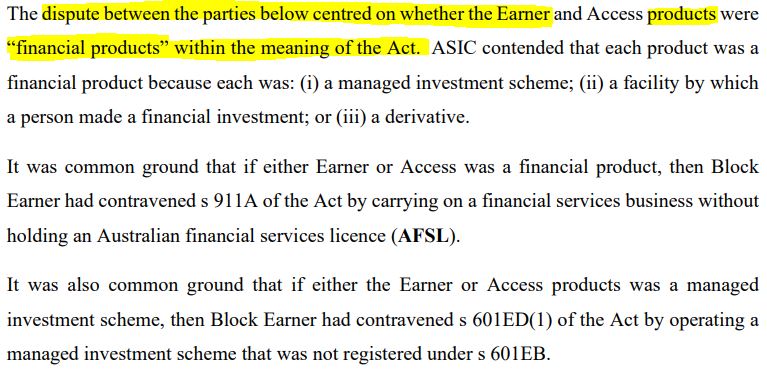The Australian Securities and Investments Commission (ASIC) is escalating its legal battle with fintech firm Block Earner to the High Court of Australia. This move aims to clarify the definition of a ‘financial product’ under Australian law, particularly concerning crypto-related services.
Background of the Block Earner Case
ASIC initially launched legal proceedings against Block Earner in November 2022. The core of the dispute revolves around Block Earner’s crypto-linked fixed-yield earning service, which ASIC argued required a financial services license. Block Earner offered this service from March 17, 2022, until it was discontinued on November 16, 2022.
In February 2024, an Australian court initially ruled that Block Earner would need a financial services license to operate its crypto yield-bearing products. However, this decision was later appealed by Block Earner.
In April 2024, the Federal Court Justices sided with Block Earner, determining that their crypto-linked fixed-yield earning product did not qualify as a financial product, a managed investment scheme, or a derivative under the Corporations Act. This ruling prompted ASIC’s current attempt to appeal to the High Court.
In June 2024, another ruling in Australia’s Federal Court released Block Earner from any financial penalties because it had “acted honestly” and pursued its legal opinions before launching the products, which ASIC appealed.
ASIC’s Concerns and Objectives
ASIC’s primary concern is the ambiguity surrounding the definition of a ‘financial product’ in the context of evolving financial technologies, including crypto assets. The regulator believes that a clear definition is crucial for protecting consumers and maintaining market integrity.
According to ASIC, the definition of financial product was drafted in a broad and technology-neutral way, and ASIC believes it is in the public interest to clarify this. This clarification is important as it applies to all financial products and services whether they involve crypto-assets or not.
Block Earner’s Position
A Block Earner spokesperson stated that the matter has now escalated to a broader legal question around the definition of a financial product, which extends well beyond Block Earner, and the crypto sector. The company remains confident in the soundness of the April ruling by the Full Federal Court, which they believe upheld the integrity of their operations.
Key Issues at Stake
The High Court’s decision will have significant implications for the regulation of crypto-related financial services in Australia. The key issues to be addressed include:
- Definition of a Financial Product: Clarifying the boundaries of what constitutes a ‘financial product’ under Australian law, especially in the context of novel crypto offerings.
- Regulation of Interest-Earning Products: Determining when interest-earning products involving crypto assets fall under regulatory purview.
- Conversion of Assets: Establishing clear guidelines on the regulatory implications of converting assets from one form to another within the crypto ecosystem.
Implications for the Crypto Industry
The outcome of this case could set a precedent for how crypto assets and related services are regulated in Australia. A clear and well-defined regulatory framework could foster innovation and growth in the crypto industry while also providing adequate consumer protection.
The High Court Appeal Process
ASIC requires special leave to appeal to the High Court, which is granted only in cases that raise significant legal questions or matters of public interest. The court will consider ASIC’s application to determine whether the case meets these criteria.

Broader Context: Crypto Regulation in Australia
This legal battle is occurring against the backdrop of evolving crypto regulations in Australia. The Australian Treasury has been actively working on developing a comprehensive regulatory framework for the crypto industry, addressing issues such as licensing, consumer protection, and anti-money laundering.
The ASIC v. Block Earner case highlights the challenges of applying existing financial regulations to the rapidly evolving world of crypto assets. The High Court’s decision is expected to provide much-needed clarity and guidance for both regulators and industry participants.
This ongoing legal saga underscores the need for a clear, consistent, and adaptable regulatory framework that can keep pace with technological innovation while safeguarding consumer interests and maintaining market integrity.